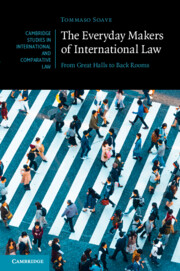'Recommended.'
D. P. Forsythe
Source: Choice
‘Written not as a monograph but almost in the style of a set of internal reflections-as-narratives, this book provides a seeming fly-in-the-wall contextual account to the many considerations that suffuse international judicial decisions and deliberations. To me, it was a significant reminder of what I had already seen from my own experiences of international practice at courts and tribunals - that such institutions remain very conscious of their judicial functions, while remaining quite unconscious of the complex humanity that drives all the seen and unseen players, hierarchies, and interactions within these august institutions that strive to provide international justice.’
Diane Desierto
Source: EJIL:Talk! (Blog of the European Journal of International Law)
‘As Soave correctly points out, international courts are still shrouded in secrecy, which prevents outsiders from fully understanding how they operate. Soave makes the most significant contribution so far to lifting this veil, and his book provides material that will be tremendously useful not only to sociolegal scholars with an interest in international law, but also to practitioners who wish to understand how the courts before which they plead cases actually function.’
Florian Grisel
Source: Law and Social Inquiry
‘Tommaso Soave’s The Everyday Makers of International Law open[s] the black box of international institutional law and apply sociological as well as anthropological methods to study the people, spaces, and processes that create international law.’
Silvia Steininger and Helga Molbæk-Steensig
Source: EJIL:Talk!
‘Soave’s approach is unusual, but it works exceptionally well. … [His] book is relevant to those studying the decision-making of international (quasi)courts. IR scholars will benefit from Soave’s empirically rich case-studies, on which they can build additional analyses. For those interested in creative methodologies or new approaches to writing, his book provides a stellar example of how to use fictional accounts within an academic publication.’
Sassan Gholiagha
Source: International Affairs
‘[H]aving started as a sceptic, I ended up liking Soave’s ‘departure from canon’: partly because for him to ‘bend the genres’ is a bold move that deserves respect in a discipline privileging safe, risk-free writing and partly because Soave writes in a distinctive style using accessible language. … Soave makes points that are far too rarely made in the orthodox accounts … [he] complements these standard accounts and succeeds where they largely fail - in acquainting readers with the everyday routines and micro-practices of international courts and tribunals. … this is what makes Soave’s book stand out. It is a significant achievement.’
Christian J. Tams
Source: European Journal of International Law
‘… Soave’s apparent joy in writing his fictional vignettes is contagious. His text provides a vivid, memorable, and convincing behind-the-scenes description of the everyday life of those responsible for making international judicial decisions. This creative and challenging book brings to light an important set of actors and activities to which the scholarship has only turned its attention in the past decade or so. As any good scholarship, it leaves the reader with a taste for more, highlighting how much more unraveling remains to be done.’
Tamar M. Egiddo
Source: American Journal of International Law



